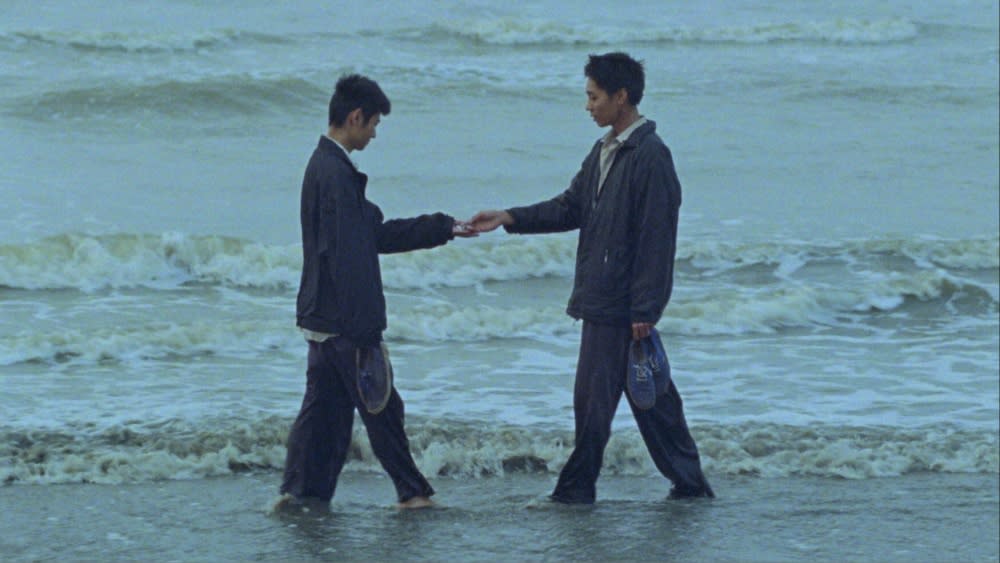‘Viet and Nam’ Review: This Spellbinding Drama Explores Young Romance — and History’s Ghosts


A number of films at this year’s Cannes have arrived at the festival surrounded in controversy. Francis Ford Coppola’s “Megalopolis” for its main cast, featuring an actor who’s soon set to go on trial for alleged assault and sexual battery. Fellow main competition title “The Seed of the Sacred Fig,” meanwhile, was shot illegally in Iran, leading to director Mohammad Rasoulof being sentenced to eight years in prison and a flogging by the country’s authorities, who pressured the festival to pull the feature from competition; Rasoulof has since fled his home country for Europe.
Flying a little under the radar in Un Certain Regard is a Vietnamese film that has been banned in Vietnam before even receiving its world premiere at Cannes. The second feature — excluding a credit in an anthology — by writer/director Truong Minh Quy (“The Tree House”), “Viet and Nam” is a queer romance that has proved controversial back home not for its characters, but reportedly for its portrayal of “a gloomy, deadlocked, and negative view” about the country and its citizens, according to an official letter from Vietnam’s Cinema Department.
While far from the cheeriest of movies, this is a curious fate for a sensitive, transfixing drama that further showcases the talents of one of Vietnam’s most exciting modern filmmakers. The film is seemingly set in 2001, as someone references watching the news that morning and seeing a plane hitting a skyscraper in New York. But among the cited influences on the feature’s inception is an incident from 2019, when 39 Vietnamese migrants were found dead in a refrigerated truck in Essex, England. Emigration through trafficking is lined up for one of the film’s leads, though an ominous, abstract prologue sets a doom-laden tone for the eventual trip not going to plan.
Shot on 16mm, the film opens on near-pitch black, as what almost looks like snowflakes begin falling as the sound of feet trudging through water can be heard. A young man appears from the darkness, slowly making his way diagonally across the screen from the top-right corner to the bottom-left one. As he gets closer, his breathing sounding heavier, we see he is carrying a shirtless man on his back; both men appear to be smeared in a black substance. We can’t tell exactly where these two are, nor properly see the water making that noise as steps are made, but it’s very clear that this location is flooding.
After a select few credits (the film’s title card doesn’t drop until close to 55 minutes in), the same two men are shown safe and sound, or as safe and sound as one can be while sitting hundreds of meters underground. They are Viet (Dao Duy Bao Dinh) and Nam (Pham Thanh Hai), two coal miners who have found love with one another in a working environment that takes its toll on both the land and those who venture this far below the surface on a regular basis. “Our lungs should now store a few kilos of coal,” Nam tells his mother, Hoa (Thi Nga Nguyen), in one scene.
“My eyes are getting weaker lately,” one of them says at another point. “Maybe I’ve spent too much time in the dark.” That may be so, but they are each other’s respective light in the darkness. So, it’s understandable that rifts emerge when Nam wants to leave the country for new prospects, through the help of an agent who smuggles people in shipping containers. He’s already training with others for certain dangers awaiting him on the imminent journey, the preparation involving being sealed in a barely human-sized plastic bag and pulled along a river bank by another person swimming. “When you are over there,” Viet wistfully says of watching this training exercise from afar, “I hope the river will be frozen so you can just walk on ice to cross the border.”
Beyond just the risks involved with the trafficking scheme, concerns about what happens to their relationship are compounded by stories like that of a local man, whose wife left the country to work as a caretaker when their daughter was just a month old, in order to send money home and get them out of poverty — that child is now in primary school, her mother still having not returned to Vietnam. Additionally, encouraged by his mother’s seemingly prophetic dreams (in which she is apparently guided by her lost love), Nam wants to make some sort of peace with the father he never knew before he leaves, who haunts him even in intimate moments with Viet.
More from IndieWire
During one post-coital scene, Viet wipes ejaculate from Nam’s naked body. Nam tells Viet that, “Every time I am about to cum, my eyes close tightly. I see a faceless man, wearing a soldier’s uniform. Maybe it’s him. Looking at your face, it’s easier for me to imagine his face.” In one of the film’s occasional instances of deadpan comedy, Viet, still cleaning, requests that Nam cease suggesting that he might look like Nam’s father.
Nam’s dad never returned from the war in the 1970s, alive or dead to be buried, though veteran Ba (Viet Tung Le), who was in the father’s unit of soldiers, suggests he has a rough idea of where he could have been when he died. Accompanied by Ba and Hoa, Viet and Nam journey across the country to try retracing a path to the past, hopefully finding the dad’s remains or at least answers, so that they can move on to their future. They are not the only ones on similar pilgrimages, with one of the most striking sequences of the second half involving our main party crossing paths with another group searching for the burial site of a different soldier who never came back home.
The various assembled travelers are led into nature by a purported psychic apparently channeling the thoughts of that other deceased soldier, who was shot by combatants and buried by his comrades, thinking they would come back soon to take his body home to his family. The psychic woman, her face painted white, lies on the spot where she’s deduced that man was buried, sobbing as she regales how decades passed in the blink of an eye. After digging takes place, a distinctive rock is pulled from the ground. “This is the flesh of your father’s head!” the guide tells the daughter who’s been searching for her father. “The flesh has turned into black dirt.”
Whether or not this character has bullshitted this other group on a loosely similar quest to Viet and Nam, this tangent is one of the film’s most fascinating explorations of how the country’s past, present and future connect to the land. From uncovering a soldier who’s become part of the earth to the nature of Viet and Nam’s job in a coal town (with the implications of pollution that stem from coal mining), there’s this sense that the people can’t break away from reshaping the natural world around them in the search of spoils, answers or a sense of purpose. Or doing so through conflict, hammered home by one attempted exhumation instead leading to an undetonated mine.
Viet and Nam try to make sense of the tragic deaths of unfortunate people like Nam’s father, while their film namesake also attempts to do similar for people like those who have perished when attempting to find a new life. Although, mystery and dreamlike logic is preferred over any clear-cut grand statements. And while a degree of naturalism does still make its way into many slow-burn scenes, Quy’s filmmaking largely favors expressionism. There’s that mysterious opening sequence with the flooding (and scenes in the final act that either echo or revisit it), but also these thrilling veers into the fantastical in even ostensibly mundane settings — in one location that’s a hybrid of a barber’s and a garage, the placement of the actors in one shot makes it seem like sparks are bursting from a man’s head.
A transcendent highpoint of the surreal flourishes comes in one of the film’s early lovemaking scenes. It’s a tight shot of Viet and Nam from their chests up, naked and making out. They’re doing so against a backdrop of coal down the mine. But as the black rock behind them glistens, the sparkles look like stars and the coal surface resembles the night sky or space. In this moment, while descended hundreds of meters below the earth, their love ascends to worlds above.
Grade: B+
“Viet and Nam” premiered at the 2024 Cannes Film Festival. It is currently seeking U.S. distribution.
Best of IndieWire
Sign up for Indiewire's Newsletter. For the latest news, follow us on Facebook, Twitter, and Instagram.

